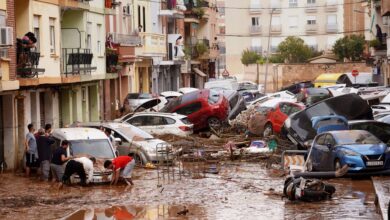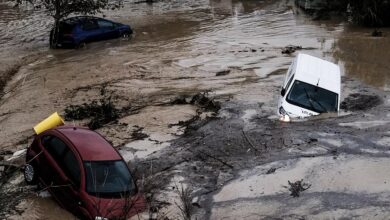The climate crisis knows no national borders: The average German temperature in 2021 was well above the long-term average. For the eleventh time in a row.
According to the German Weather Service (DWD), the weather balance for the past year clearly confirms the trend towards global warming. It was the eleventh year that was too warm in a row, it said on Tuesday when the DWD’s climate status report was presented in Berlin.
The average temperature was 9.2 degrees, just under one degree above the value of the reference period 1961 to 1990.
At the end of December 2021, the DWD had already presented a preliminary annual balance sheet, from which much of the data was already evident.
Warmer from decade to decade
According to DWD data, every decade in Germany since the 1970s has been warmer than the previous one. According to climate research, the increase in mean temperature will lead to more and more intense weather extremes in the coming years.
“Climate change is becoming more and more directly noticeable to all of us, is no longer an abstract statistical parameter and shows that ambitious climate protection is also in the national interest,” explains Andreas Becker, head of the DWD’s climate monitoring department, in the report.
The ongoing climate change leads to extreme weather events
The catastrophic floods in North Rhine-Westphalia and Rhineland-Palatinate made it painfully clear that Germany is also vulnerable to extreme events. In the Ahr Valley in Rhineland-Palatinate alone, 134 people died in the flood disaster in July, thousands of buildings and a large part of the infrastructure in the flooded areas were destroyed.
“We must therefore prepare better for such events in the future,” said Becker. In terms of overall precipitation, 2021 was a rather average year. The very wet summer was followed by an autumn that was clearly too dry.
According to Becker, the most and most intense heavy precipitation usually occurs between May and September – and can hit any location. A closed warning chain from the DWD to the responsible emergency services on site plays a key role in preparing for more intense and frequent extreme weather events.
The population often misjudges the risks
But it is also important to strengthen the risk awareness of the population. So far, there has been a lack of it, experts had already emphasized on Monday.
“We have to make it clear to people that it’s now a matter of life and death for us too,” said the director of the Alfred Wegener Institute, Antje Boetius, at the beginning of the forum “Water extremes as a result of climate change” in Bremerhaven. It is also important to teach children what to do in the event of a disaster.

 Pro-Western president wins in Moldova – EU relieved
Pro-Western president wins in Moldova – EU relieved In the Italian Alps: Four mountain climbers die in accidents
In the Italian Alps: Four mountain climbers die in accidents Spain: Thousands of people are still waiting to be rescued
Spain: Thousands of people are still waiting to be rescued More than 50 dead in floods in Spain
More than 50 dead in floods in Spain